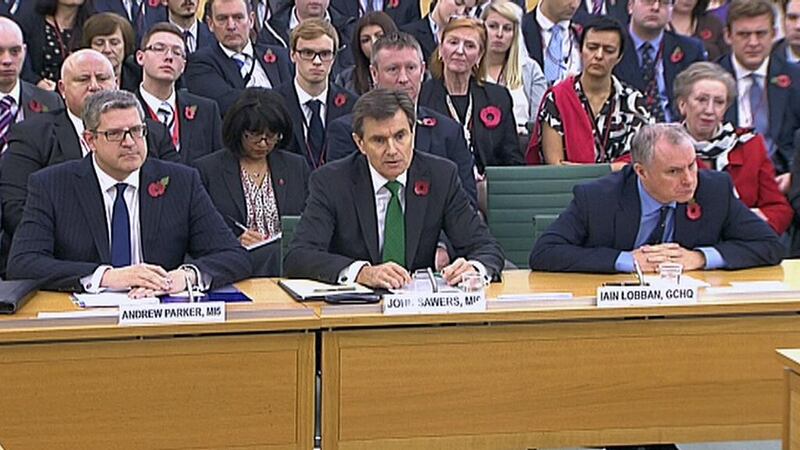LONDON // The intelligence leaks from US analyst Edward Snowden have left Britain’s enemies “rubbing their hands with glee”, the head of the MI6 spy agency said yesterday.
Al Qaeda and other British intelligence targets are having a field day with the leaks from Mr Snowden, a former National Security Agency contractor, UK spy chiefs said in a strong condemnation of the spying revelations.
Iain Lobban, chief of the eavesdropping agency GCHQ, said his spies have picked up “near-daily discussion” of the unauthorised disclosures among his agency’s targets. His colleague John Sawers, the chief of the British foreign spy agency MI6, was even more explicit.
“It’s clear that our adversaries are rubbing their hands in glee,” he told British MPs. “Al Qaeda is lapping it up.”
Mr Lobban, Mr Sawers and Andrew Parker, head of MI5, Britain’s domestic spying agency, were giving their first public, televised testimony to British MPs on Parliament’s Intelligence and Security Committee. Their appearances came amid a fierce international debate over British and American intelligence tactics — an uproar triggered by Mr Snowden’s revelations.
All three spy chiefs insisted their agencies operate within the law, guaranteeing parliamentarians that their work was both legal and proportionate.
“We do not spend our time listening to the telephone calls or reading the emails of the majority,” said Mr Lobban.
During a wide-ranging, 90-minute session, the spy chiefs discussed the war in Syria, cyber-attacks against the UK and the lingering terror threat from Northern Ireland.
Syria got a particular amount of attention, with Mr Parker warning that the civil war there was drawing in a large number of British residents to fight in the service of Islamic extremism. He said his intelligence service had “seen low hundreds of people from this country go to Syria,” noting that some” of them had since returned to the UK
Mr Lobban said the Snowden revelations had led “terrorist groups” in the Middle East, Afghanistan and elsewhere to alter the way they communicate.
“We have intelligence on (and) we have actually seen chat around specific terrorist groups, including closer to home, discussing how to avoid what they now perceive to be vulnerable communications methods,” Mr Lobban said.
Associated Press





